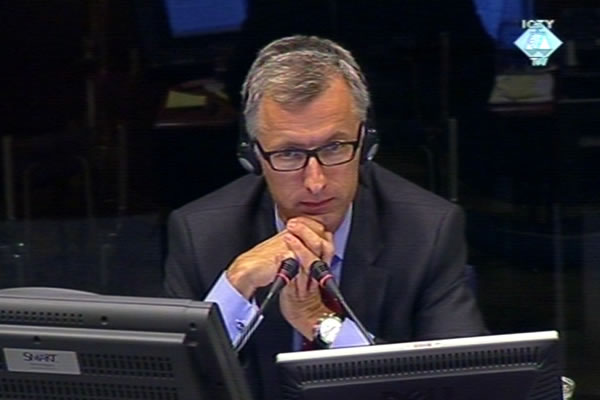Home
STANISIC WASHES HIS HANDS OF SESELJ’S MEN
Denying there were any ties between Seselj’s men and the Serbian secret service, Jovica Stanisic’s defense counsel used sources from the Serbian Radical Party claiming that in the spring of 1991, Chetnik volunteers had to cross into Croatia by boat, because the police would not let them cross the Danube on the bridges. Military expert Reynaud Theunens replied that the government’s attitude towards the paramilitaries changed from initial animosity to final acceptance and recalled that in September 1991, before the attack on Vukovar, Seselj’s men were bussed into Croatia; the police knew about the transports
 Reynaud Theunens, witness at the Jovica Stanisic and Franko Simatovic trial
Reynaud Theunens, witness at the Jovica Stanisic and Franko Simatovic trial As Jovica Stanisic’s defense lawyer continued his cross-examination of Reynaud Theunens, prosecution military expert, he did his best to challenge Theunens’s conclusion that the Serbian MUP tolerated and supported the activities of Seselj’s men in the early nineties.
In his expert report, Theunens confirmed for the most part the prosecution case that the Serbian MUP and the State Security Service, as its part, tolerated the activities of the paramilitary units, including Seselj’s volunteers. Jovica Stanisic and Franko Simatovic are charged with the crimes the paramilitary and police units committed in the wars in Croatia and BH.
Denying there were any ties between Seselj’s men and the Serbian secret service, defense counsel Jordash brought up the Serbian Radical Party paper, ‘Greater Serbia’. A report there said that in the spring of 1991, Chetnik volunteers had to cross into Croatia by boat because the police would not let them cross the Danube on the bridges. The defense also showed the witness an earlier interview in which Seselj claimed the Radicals had to smuggle people in boats, because ‘they were more scared of the Serbian army and police than of the Ustashas’.
As Theunens replied, there was some animosity towards the paramilitary units on the part of the government at first, but as time went by, the attitude changed to acceptance. He recalled that as early as in September 1991, before Vukovar came under attack, Seselj’s men were transported into Croatia by bus; both the police and the border control knew about those transports.
The defense counsel then tried to portray the Radicals as part of an opposition front fighting Milosevic’s Socialist Party of Serbia which was in power at the time. Theunens, however, said their relationship quickly grew from initial mistrust into cooperation. The Belgian expert says the two political options ‘found each other’ with time: Serbian president Milosevic used the Radicals to achieve his goals, and Seselj ‘relished’ the relationship because he was able to advance.
They worked together from early 1992 until November 1993, the witness said, adding that the documents show the Serbian state security service throughout this time had the SRS War Staff under surveillance, but did nothing to put a stop to its work. The first arrests of Chetnik volunteers happened only when Seselj and Milosevic parted ways politically. And yet, as Theunens said, the documents he had inspected showed that Seselj’s men and the Serbian MUP went on working together smoothly into the early 1993 in various operations in BH.
The defense lawyer criticized Theunens for quoting Seselj’s statements often in his report, asking the prosecution expert, ‘isn’t it clear that Seselj is not a reliable source of information’. The witness, according to his reply, took the Radical Party leader’s statements with a grain of salt, always trying to corroborate them from other sources. Although the defense lawyer labeled Seselj ‘an unreliable source’, he referred to portions of Seselj’s testimony in the Slobodan Milosevic case, where the Serbian Radical Party leader said he had met Stanisic only once in 1992 and that he was ‘at odds’ with Stanisic constantly. Theunens’s reply to this question was given for the most part in closed session.
Reynaud Theunens’s cross-examination will continue on Monday.
Linked Reports
- Case : Stanisic & Simatovic
- 2010-10-28 VOLUNTEERS WERE ARRESTED TOO LATE
- 2010-10-26 STATE SECURITY UNDER THE WATCHFUL EYE OF MILITARY SECURITY
- 2010-10-04 BRIEFING WITH FRENKI
- 2010-11-01 DID POLICE VIOLATE CITIZENS’ RIGHT TO DEFENSE?
- 2010-11-02 SIMATOVIC’S DEFENSE: ‘POLICE DIDN’T CONTROL VOLUNTEERS’
- 2010-11-03 FRENKI WANTS NOTHING TO DO WITH THE ‘RED BERETS’
